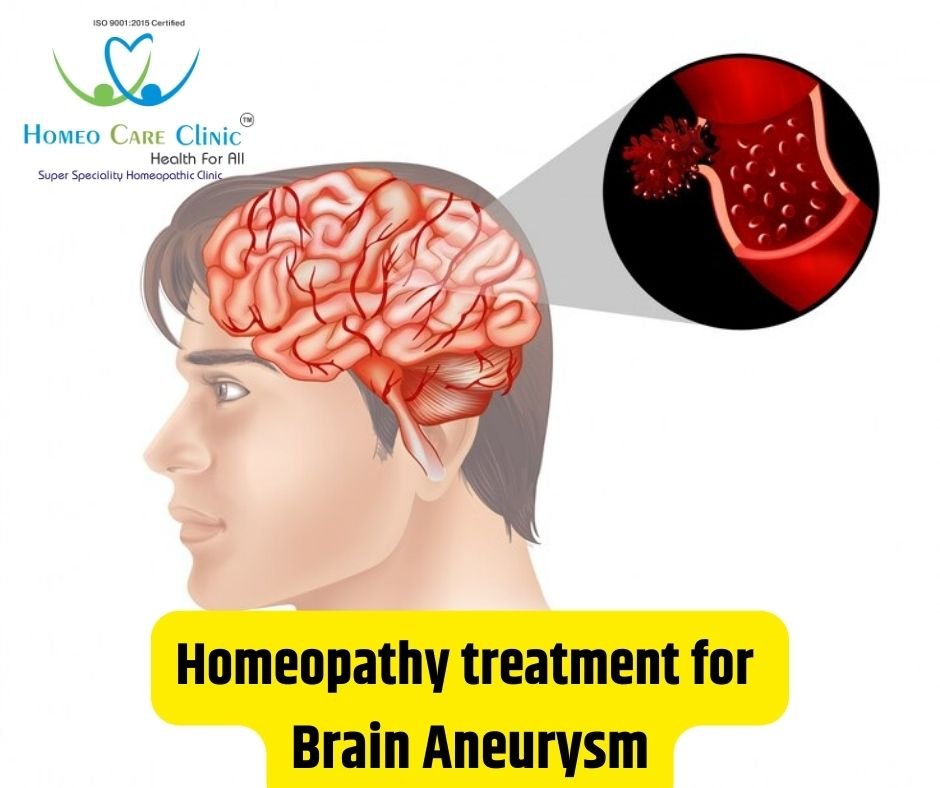A brain aneurysm, also called a cerebral aneurysm, is a bulge or ballooning in a blood vessel in the brain. Often, it forms due to the thinning of the vessel walls. While not every aneurysm ruptures, when it does, it can lead to serious health complications, such as hemorrhagic stroke, brain damage, or even death. Conventional treatment often involves surgery or endovascular repair, but many individuals seek complementary options like homeopathy for managing symptoms and improving overall health.
In this blog, we will explore brain aneurysms, their causes, symptoms, prevention tips, and the role of homeopathy in providing supportive care.
What is a Brain Aneurysm?
A brain aneurysm occurs when a weakened area in the wall of a blood vessel balloons outward. It can occur in various parts of the brain but is most commonly found at the base of the brain in the arteries. Aneurysms can vary in size from small (less than 5 mm) to large (over 25 mm). They are categorized into:
- Saccular Aneurysm: A rounded pouch-like structure.
- Fusiform Aneurysm: A spindle-shaped dilation affecting the entire circumference of the vessel.
- Ruptured Aneurysm: When the aneurysm bursts, causing bleeding in the brain.
Symptoms of Brain Aneurysm
Unruptured aneurysms often show no symptoms. However, when symptoms occur, they may include:
- Headaches (localized or generalized)
- Blurred or double vision
- Pain above or around the eye
- Dilated pupils
- Difficulty speaking
- Weakness or numbness on one side of the body
- Difficulty concentrating
Symptoms of Ruptured Aneurysm:
- Sudden severe headache (often described as the “worst headache ever”)
- Nausea and vomiting
- Stiff neck
- Sensitivity to light
- Loss of consciousness
- Seizures
These symptoms require immediate medical attention.
Brain Aneurysm Causes and Risk Factors
The exact cause of brain aneurysms is unclear, but several factors may contribute:
- Genetics: A family history of aneurysms increases the risk.
- Lifestyle Factors: Smoking and excessive alcohol consumption can weaken blood vessel walls.
- Medical Conditions:
- High blood pressure
- Atherosclerosis
- Polycystic kidney disease
- Connective tissue disorders
- Trauma or Infection: Head injuries or infections affecting blood vessels.
Preventive Measures
While some factors, like genetics, are uncontrollable, others can be managed to reduce the risk:
- Maintain healthy blood pressure levels.
- Avoid smoking and limit alcohol intake.
- Eat a balanced diet rich in fruits, vegetables, and whole grains.
- Exercise regularly to maintain cardiovascular health.
- Manage stress through yoga, meditation, or other relaxation techniques.
Conventional Medical Approach:
The conventional medical approach to treating brain aneurysms typically involves monitoring the aneurysm’s size and condition through imaging studies such as magnetic resonance angiography (MRA) or computed tomography angiography (CTA). If the risk of rupture is deemed high, surgical intervention may be recommended. This can include procedures such as surgical clipping or endovascular coiling, aimed at preventing rupture or re-rupture of the aneurysm.
How Homeopathy Helps
Homeopathy is a holistic system of medicine that aims to address the root cause of a condition and restore the body’s natural balance. In the context of brain aneurysms, homeopathy focuses on strengthening the vascular system, reducing symptoms, and improving overall well-being. While homeopathy cannot replace surgical interventions for ruptured aneurysms, it can offer supportive care and preventive strategies.
Homeopathic Medicine for Brain Aneurysm
- Baryta Carbonica
- Useful for individuals with high blood pressure or arterial weakness.
- Ideal for those prone to aneurysms due to aging or arteriosclerosis.
- Belladonna
- Recommended for throbbing headaches and sudden vascular symptoms.
- Suitable for patients experiencing sensitivity to light and noise.
- Glonoine (Nitroglycerin)
- Helps with severe headaches and pulsating sensations in the head.
- Effective for individuals with blood pressure fluctuations.
- Lachesis Mutus
- Suitable for those with congestive headaches and a history of vascular issues.
- Helpful in managing left-sided symptoms and sensitivity to touch.
- Conium Maculatum
- Recommended for dizziness and weakness, especially in elderly patients.
- Supports blood vessel health in degenerative conditions.
- Nux Vomica
- Beneficial for stress-related headaches and high blood pressure.
- Supports overall vascular health in individuals with a sedentary lifestyle.
* Note – Above medicines are for knowledge purpose only. Take the medication only after doctor’s consultation. DO NOT SELF MEDICATE
Individualized Treatment
Homeopathy follows the principle of individualization. A homeopath will consider the patient’s medical history, lifestyle, emotional state, and specific symptoms before prescribing remedies. It is important to consult a qualified homeopath for a personalized treatment plan
Case Study: Integrating Homeopathy in Aneurysm Management
A 50-year-old patient with a family history of aneurysms and high blood pressure sought homeopathic treatment. The patient reported frequent headaches, dizziness, and anxiety about their condition. After a detailed consultation, the homeopath prescribed Baryta Carbonica to strengthen arterial walls and Nux Vomica to address stress-related symptoms. Over six months, the patient reported fewer headaches and improved overall well-being, along with better blood pressure control.
FAQs Homeopathy and Brain Aneurysm
Is homeopathy safe for treating brain aneurysms?
- Homeopathy is generally considered safe when prescribed by a qualified practitioner. However, it’s essential to consult with a healthcare professional for proper diagnosis and treatment guidance.
Can homeopathy be used alongside conventional treatments for brain aneurysms?
- Yes, homeopathy can be used as a complementary therapy alongside conventional treatments. However, it’s crucial to inform all healthcare providers about any treatments or medications being used.
How long does it take to see results with homeopathic treatment?
- The timeline for seeing results with homeopathic treatment varies depending on the individual’s response to the remedies and the severity of the condition. Some individuals may experience improvement relatively quickly, while others may require more time.
In Conclusion
Homeo Care Clinic offers a holistic approach to treating the disease. The remedies mentioned above can treat the underlying causes of the condition and offer relief from the discomfort. However, it is important to consult a qualified homeopathic practitioner for the correct dosage and duration of treatment. Homeo Care Clinic provides comprehensive care for various ailments, and offers customized treatment plans based on individual requirements.
To schedule an appointment or learn more about our treatment, please visit our website or give us a call +91 9595211594 our best homeopathy doctor will be here to help.
Follow us on Facebook, Twitter, and Instagram for valuable insights into the world of homeopathy and holistic health.
Facebook – https://www.facebook.com/homeocareclinicpune
Instagram – https://www.instagram.com/homeocareclinic_in
Website – https://www.homeocareclinic.in
Case study of our Patient – homeocareclinic.in/category/case-study
YouTube Patient Review – https://www.youtube.com/playlist?list=PL__SnPQCl4WLPFV7iJOdQxn4YaB6IkPHJ
LinkedIn – linkedin.com/company/homeo-care-clinic
Chat with a best homeopathic doctor privately
If you have any queries regarding your disease or any symptoms, click to send a WhatsApp message. Our best homeopathy doctor will be happy to answer you.
Book an Appointment
If you want to visit our clinic, click to book an appointment.
Online treatment
If you are a busy professional, or you are living in a remote town or city, with no best homeopathic doctor near you, Click to start an online homeopathic treatment with the world’s exclusive, most experienced and best homeopathic clinic, managed by Dr. Vaseem Choudhary world-renowned homeopathic doctor expert







